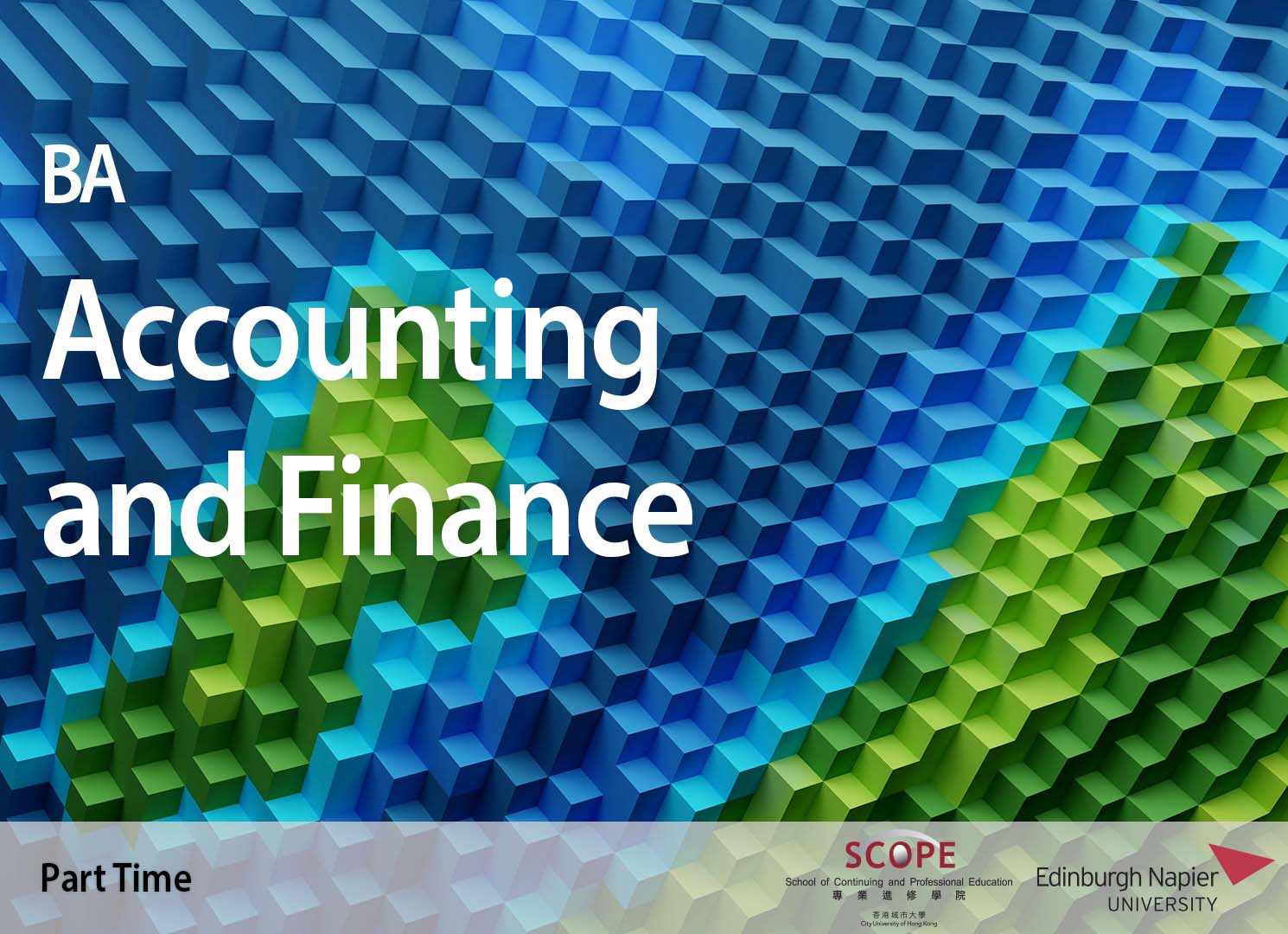BA Accounting and Finance, Edinburgh Napier University
Module Descriptions


BA Accounting and Finance, Edinburgh Napier University
Module Descriptions
Accounting & Financial Management (ACC08901)
What you will learn and what this module is about:
Students will be introduced to the theory and practice of management accounting, financial accounting and financial management. This will provide a foundation for future studies of accounting and financial management.
Description of module content:
Comparison of management and financial accounting, along with costing, variance analysis and CVP analysis. The context and purpose of financial reporting, the use of double entry system, recording transactions and events and the preparation of basic financial statements, investment appraisal, working capital management, tactical decision making and cost estimation.
Financial Institutions, Markets & Services (FIN08911)
What you will learn and what this module is about:
The module aims to provide those of you who are thinking of a career in almost any area of financial services with a good understanding of the financial services industry, the financial services sector, financial institutions, and financial products and advice. Almost every specialist area of financial services develops from a sound knowledge of these key aspects. The module provides you with the opportunity to acquire a good understanding of the financial institutions (e.g. banks, insurance companies) and how they function, financial markets (e.g. stock market, payments market), and financial services provided to customers (e.g. investment services, insurance).
Description of module content:
Money and the flow of funds in the economy-functions of money; definitions of money; money transmission and clearing; payments markets; Financial sector-banking and non-banking financial intermediaries; regulation and self-regulation; retail, wholesale and central banking; Financial markets-capital markets, money markets and other markets; financial instruments in financial markets; Financial intermediation-financial needs of lenders and borrowers and how they are reconciled; risk, term and return; Electronic financial services-cost/convenience match; growth in remote services; meeting the financial needs of customers through remote services; Researching and analysing financial information – institution websites, industry reports, share information and price tracking, financial press reports and data; calculating yields and interest rates.
Advanced Management Accounting (ACC09902)
What you will learn and what this module is about:
On completion of this module you will be able to apply specialist techniques such as activity based costing, lifecycle costing, target costing and throughput accounting. In addition, you will understand the concept of relevant costing and management attitude to risk in decision making. You will be able to apply current budgeting theories (Zero Based Budgeting and Activity Based Budgeting) and use forecasting techniques, examples of which are Time Series, Regression and the Growth Model. You will gain an increased understanding of standard costing which builds on previous knowledge through becoming familiar with current thinking on the standard setting process and relevance of standard costing. Finally, you will be able to assess divisional performance using a range of measures while taking into account the problems of inter divisional transfer pricing on the measurement of performance.
Description of module content:
Specialist techniques (activity based costing, lifecycle costing, target costing, throughput accounting; Decision making (relevant costs, multiple limiting factors and risk); Pricing (economists model, generic strategies, customer specific pricing); Budgeting (budget theory, zero based budgeting, activity based budgeting, forecasting techniques to include time series, regression and growth model); Standard costing (planning and operational variances, mix and yield, learning curve, relevance of standard costing in a just in time and total quality environment); Performance measurement (measurement of divisional performance to include return on investment, residual income and net present value, transfer pricing, management behaviour).
Advanced Corporate Reporting (ACC09905)
What you will learn and what this module is about:
You will learn about a number of complex areas of financial accounting for tangible & intangible assets and financial instruments and provisions including recognition criteria, principles of measurement and alternative valuation models. You will also cover the preparation of financial statements for group companies.
Description of module content:
Conceptual frameworks, accounting standard setting and other forms of regulation; Recognition criteria and principles of measurement for more complex accounting items e.g. fixed assets, financial instruments and provisions; Alternative valuation models; Business combinations including acquisition accounting, subsidiaries, associates, segmental reporting and discontinued operations.
Corporate Financial Management (ACC09901)
What you will learn and what this module is about:
The knowledge and skills required by a finance manager in a national or international business. You will explore the key areas of the finance function in a very practical way with the conceptual framework in the background and examine the issues involved and the ways in which the finance function can add value to the governance of the company.
Description of module content:
The role of the financial function; Impact of the economic environment on the financial management; The investment decision and risk; Evaluation of alternative sources of long and short term financing; The cost of capital and asset valuation; Treasury risk management.
Marketing Financial Services (FIN09903)
What you will learn and what this module is about:
The objective of this module is to provide you with an understanding of the principal features of a critical area of management and strategy within the financial services sector where, due to the very competitive nature of the business environment, marketing is extremely important.
Description of module content:
The role of marketing and its development within financial services; The macro and micro marketing environment and the way in which the forces have influenced marketing strategy within the sector; The features of financial services marketing - intangibility, inseparability, heterogeneity, perishability, fiduciary responsibility and two-way information flows; The marketing mix with the additional elements of the services mix; Segmentation strategies and their importance, particularly within the personal financial services sector; The importance of service quality as a route to differential advantage; Recent marketing developments within the sector with particular reference to the impact and importance of information technology in areas such as product development and delivery.
Hong Kong Taxation (ACC09903)
What you will learn and what this module is about:
This module will provide you with a knowledge and understanding of the principles and practices of direct taxation in Hong Kong. You will also learn to evaluate the tax implications of corporate planning and decision making.
Description of module content:
Hong Kong taxation system, its purpose, requirements and principles; Salaries tax including charges, deductions, allowances and planning, properties tax, profits tax including charges, taxable income, treatment of losses, partnerships and planning personal assessment; Stamp duty – computation, exemption, relief and planning; Other special tax planning issues.
Corporate Risk Management (FIN09904)
What you will learn and what this module is about:
All organisations are faced with a variety of risks on an on-going basis. Sometimes these risks will result in losses to the business while, at other Times, they will present the business with the chance to generate substantial returns. If losses are to be avoided or, at least, minimised and returns achieved, these risks need to be managed effectively. In this module you will look at the nature of the risks with which organisations are faced and how these should be managed to the overall benefit of the business and its stakeholders.
Description of module content:
Features of risk, level of risk, classification of risk, cost of risk, organization of risk; Essentials of risk management, risk identification methods, risk analysis and evaluation, physical and financial control methods; Risk behavior analysis, risk and decision-making; Loss prevention and reduction, loss accumulation; Contingency planning, business continuity planning, disaster recovery concept and techniques; Insurance and non-insurance transfer, limitations and constraints of insurance, advantages of insurance; Risk financing, full and partial retention alternatives, captives; The emerging concept of enterprise risk management.

